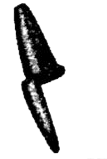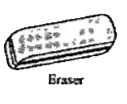Which of the following objects can conduct electricity?




To determine which objects can conduct electricity, we need to classify materials into two categories: conductors and insulators.
1. Understand Conductors and Insulators:
- Conductors are materials that allow electricity to flow through them easily. Common examples include metals like copper, aluminum, iron, and brass.
- Insulators are materials that do not allow electricity to flow through them easily. Examples include plastic, rubber, wood, and glass.
2. Identify the Objects:
- We need to look at the list of objects provided in the question and categorize them based on whether they are conductors or insulators.
3. Analyze Each Object:
- Plastic Cap: This is made of plastic, which is an insulator. Therefore, it cannot conduct electricity.
- Eraser: Typically made of rubber, which is also an insulator. Hence, it cannot conduct electricity.
- Spoon: Usually made of metal (like stainless steel), which is a conductor. Therefore, it can conduct electricity.
- Brush: Brushes are often made with plastic or other insulating materials, so they cannot conduct electricity.
- Toothbrush: Similar to the brush, it is generally made of plastic, which is an insulator. Thus, it cannot conduct electricity.
- Pencil: The outer covering is made of wood (an insulator), but the inner part (graphite) is a conductor. Therefore, a pencil can conduct electricity through its graphite.
4. Conclusion:
- The objects that can conduct electricity from the given options are the spoon and the pencil (due to its graphite).
Final Answer:
The objects that can conduct electricity are the spoon and the pencil (because of the graphite inside).
---
- Conductors are materials that allow electricity to flow through them easily. Common examples include metals like copper, aluminum, iron, and brass.
- Insulators are materials that do not allow electricity to flow through them easily. Examples include plastic, rubber, wood, and glass.
- We need to look at the list of objects provided in the question and categorize them based on whether they are conductors or insulators.
- Plastic Cap: This is made of plastic, which is an insulator. Therefore, it cannot conduct electricity.
- Eraser: Typically made of rubber, which is also an insulator. Hence, it cannot conduct electricity.
- Spoon: Usually made of metal (like stainless steel), which is a conductor. Therefore, it can conduct electricity.
- Brush: Brushes are often made with plastic or other insulating materials, so they cannot conduct electricity.
- Toothbrush: Similar to the brush, it is generally made of plastic, which is an insulator. Thus, it cannot conduct electricity.
- Pencil: The outer covering is made of wood (an insulator), but the inner part (graphite) is a conductor. Therefore, a pencil can conduct electricity through its graphite.
- The objects that can conduct electricity from the given options are the spoon and the pencil (due to its graphite).
The objects that can conduct electricity are the spoon and the pencil (because of the graphite inside).
Topper's Solved these Questions
- ELECTRIC CURRENT AND ITS EFFECTSBOOK - BEIITIANSCHAPTER - ELECTRIC CURRENT AND ITS EFFECTSEXERCISE - SUMMATIVE WORKSHEET
23 Videos
- ELECTRIC CURRENT AND ITS EFFECTSBOOK - BEIITIANSCHAPTER - ELECTRIC CURRENT AND ITS EFFECTSEXERCISE - HOTS WORKSHEET
14 Videos
- ELECTRIC CURRENT AND ITS EFFECTSBOOK - BEIITIANSCHAPTER - ELECTRIC CURRENT AND ITS EFFECTSEXERCISE - IIT JEE WORKSHEET (V. Matrix Matching)
3 Videos
- HEATBOOK - BEIITIANSCHAPTER - HEATEXERCISE - IIT JEE Worksheet (V. Matrix Matching)
4 Videos
Similar Questions
Knowledge Check
Which of the following does not conduct electricity ?
AMolten NaOHBMolten KOHCSolid NaClDAqueous NaClWhich of the following does not conduct electricity ?
ALime juiceBSalt solutionCPure waterDMetalWhich of the following does not conduct electricity ?
AFused NaClBSolid NaClCBrine solutionDCopper
Which of the following does not conduct electricity?
View SolutionWhich of the following does not conduct electricity?
View SolutionWhich of the following does not conduct electricity in aqueous solution?
View SolutionWhich of the following can conduct electricity in?
View SolutionWhich of the following will not conduct electricity ?
View Solution
